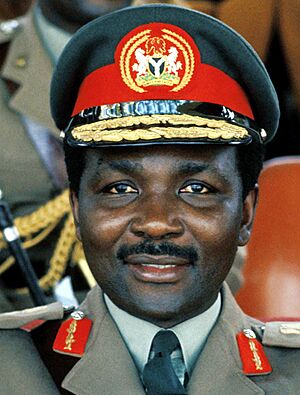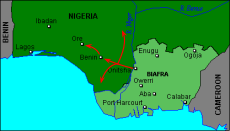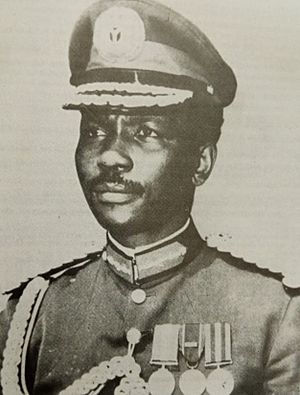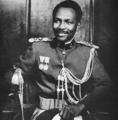Yakubu Gowon facts for kids
Quick facts for kids
General
Yakubu Gowon
|
|
|---|---|

Gowon in 1970
|
|
| 3rd Head of State of Nigeria | |
| In office 1 August 1966 – 29 July 1975 |
|
| Chief of Staff | J. E. A. Wey |
| Preceded by | Johnson Aguiyi-Ironsi |
| Succeeded by | Murtala Mohammed |
| Chairperson of the Organisation of African Unity | |
| In office 27 May 1973 – 12 June 1974 |
|
| Preceded by | Hassan II |
| Succeeded by | Siad Barre |
| Federal Commissioner of Defence | |
| In office 1966–1975 |
|
| President | Himself |
| Preceded by | Inuwa Wada |
| Succeeded by | Illiya Bisalla |
| Federal Commissioner for External Affairs | |
| In office 1966–1967 |
|
| Preceded by | Nuhu Bamalli |
| Succeeded by | Arikpo Okoi |
| Chief of Army Staff | |
| In office 16 January 1966 – 29 July 1966 |
|
| Preceded by | Johnson Aguiyi-Ironsi |
| Succeeded by | Joseph Akahan |
| Personal details | |
| Born | 19 October 1934 Kanke, Northern Region, British Nigeria (now Kanke, Plateau, Nigeria) |
| Spouse |
Victoria Zakari
(m. 1969) |
| Alma mater |
|
| Occupation |
|
| Nickname | "Jack" |
| Military service | |
| Allegiance | Nigeria |
| Branch/service | Nigerian Army |
| Years of service | 1954–1975 |
| Rank | General |
| Battles/wars | Congo Crisis Nigerian Civil War |
Yakubu Dan-Yumma "Jack" Gowon (born 19 October 1934) is a Nigerian general and important leader. He served as the military head of state of Nigeria from 1966 to 1975.
Gowon led Nigeria during the Nigerian Civil War. After the war ended, he gave a famous speech saying "no victor, no vanquished." This speech was meant to help the country heal and come together again. The Nigerian Civil War was one of the deadliest in modern history. Gowon has always said that his leadership helped save the country. He described the war period as the most difficult time of his life, stating that the war was never his choice.
Gowon is a Christian from a smaller ethnic group called Ngas in Northern Nigeria. He strongly believes in Nigeria's unity. He became leader after a military takeover in July 1966. He was the head of state for almost nine years, which is the longest continuous period for a Nigerian leader. He was later removed from power in 1975.
Contents
Early Life and Education
Yakubu Gowon is from a small village called Lur in what is now Plateau State. His parents, Nde Yohanna and Matwok Kurnyang, were missionaries. They moved to Wusasa, Zaria, when Gowon was very young. He was the fifth of eleven children.
Gowon grew up and went to school in Zaria. He was a great athlete at school. He was the school's football goalkeeper, a pole vaulter, and a long-distance runner. He even broke the school's mile record in his first year. He was also the boxing captain.
Military Career Beginnings
Gowon joined the Nigerian Army in 1954. He became a second lieutenant on his 21st birthday, 19 October 1955. He trained at famous military academies like the Royal Military Academy Sandhurst in the UK (1955–56) and the Staff College, Camberley, UK (1962). He also attended the Joint Staff College, Latimer in 1965.
He served in the Congo Crisis as part of the United Nations Peacekeeping Force in 1960–61 and again in 1963. By 1966, he had become a battalion commander.
Nigeria's Political Changes in 1966
In January 1966, a group of junior military officers carried out a military coup. This led to the overthrow of Nigeria's civilian government. Many leaders, especially from the northern and western parts of the country, were killed. These included Nigeria's Prime Minister, Sir Abubakar Tafawa Balewa.
After this coup, Major General Johnson Aguiyi-Ironsi became the head of state. Gowon was his Chief of Staff. However, there was anger in the Northern part of Nigeria because the coup plotters were not punished.
The July Counter-Coup
In July 1966, another military takeover happened. This was called the July counter-coup. General Aguiyi-Ironsi had introduced a new rule that changed Nigeria from a federal system (where states have some power) to a unitary state (where the central government has most power). Many Northerners saw this as an attempt by Southerners to take over power.
The officers who planned this second coup initially wanted the Northern region to leave Nigeria. But important advisors, including officials from the British and American governments, convinced them not to. Instead, they decided to make Lieutenant Colonel Gowon the new Head of State. Gowon had not been actively involved in the coup until that point. When he became leader, he brought back the federal system of government.
Leading the Nation
In 1966, Gowon was chosen to lead Nigeria. Before this, he was purely a soldier and not involved in politics. The difficult events of that year suddenly put him in a leadership role. He was a good choice because he was from the North but was not from the major Hausa or Fulani groups, and he was Christian, not Muslim. This made him a safe choice to lead a country facing ethnic tensions.
Gowon promoted himself twice while he was Head of State. He was a Lieutenant Colonel when he took power in August 1966. To make his position stronger, he promoted himself to Major-General before the civil war started in 1967. He became a full General at the end of the civil war in 1970.
The Nigerian Civil War
Before the Eastern Region could try to leave Nigeria, Gowon quickly created twelve new states. These new states replaced the four old regions. Six of these new states were for minority groups who had wanted their own states for a long time. Gowon believed that these minority groups in the East would not support the Igbo people if they knew they could have their own states. Many of the soldiers who fought in the Nigerian Civil War, also known as the Biafran War, were from these minority groups.
The war lasted for thirty months and ended in January 1970. When Biafra agreed to a cease-fire, Gowon famously said that there would be "no victor and no vanquished." This meant that no one truly won or lost, and everyone should work together. The years after the war were called a time for rebuilding and healing. Nigeria's income from oil increased greatly in 1973, which helped the government with these tasks.
There was a lot of tension between the Eastern Region and Gowon's federal government. In January 1967, Gowon and the Biafran leader, Chukwuemeka Odumegwu Ojukwu, met in Ghana to try and solve their problems. They agreed on something called the Aburi Accord. However, Gowon's government did not fully follow this agreement. This was partly because of the large oil reserves found in the Niger Delta area, which were very important for Nigeria's economy.
To reduce Ojukwu's power in the East, Gowon announced on 5 May 1967 that Nigeria would be divided into 12 states instead of three regions. From Ojukwu's Eastern Region, three new states were created: Rivers State, South-Eastern State, and East-Central State. The Rivers and South-Eastern states had oil and access to the sea. This move helped to separate the Igbo areas into the East-Central state.
On 30 May 1967, Ojukwu declared that the Eastern Region was formally leaving Nigeria and would be known as the Republic of Biafra. This started the war, which lasted about 30 months. Many people died during the war, especially civilians who suffered from starvation due to a Nigerian blockade. The Nigerian Army grew much larger and stronger during this time.
After the War: "No Victor, No Vanquished"
The war officially ended on 13 January 1970. The next day, Colonel Olusegun Obasanjo announced the surrender of Biafran forces. Gowon then gave his famous "no victor, no vanquished" speech. He also offered forgiveness to most of those who had supported Biafra. He started a program of "Reconciliation, Reconstruction, and Rehabilitation" to fix the damage to the Eastern Region's economy and buildings.
During the oil boom, Gowon's government made a decision in 1972 called the "indigenization decree." This rule limited foreign investment in many parts of the Nigerian economy. While it helped some Nigerians, it made it harder for foreign companies to invest in non-oil businesses in Nigeria.
After the civil war, Nigeria's economy grew very quickly because of oil. The federal government's activities also increased a lot. However, this period also saw a rise in corruption, especially bribery among government officials. Even though General Gowon himself was not found to be corrupt, some people accused him of not paying enough attention to what his staff and friends were doing.
On 1 October 1974, Gowon announced that Nigeria would not be ready for civilian rule by 1976, as he had promised earlier. He said the return to civilian rule would be delayed indefinitely. Also, as the government grew, there were more claims of corruption. There were stories of fake import licenses being used.
Overthrow from Power
These problems caused serious unhappiness within the army. On 29 July 1975, while Gowon was at a meeting in Uganda, a group of officers led by Colonel Joe Nanven Garba announced that he had been removed from power. The new government was led by Brigadier Murtala Muhammed, with Brigadier Olusegun Obasanjo as his deputy.
Life After Leadership
After being overthrown, Gowon went to live in the United Kingdom. He studied at the University of Warwick and earned a Ph.D. in political science. He became part of the English community where he lived and even served as a churchwarden in his local church.
Events in 1976
In February 1976, Murtala Mohammed was killed in a failed attempt to overthrow the government. The leader of this attempt, Lt. Col Buka Suka Dimka, said that Gowon had supported the coup. Dimka also said that the goal of the coup was to bring Gowon back as head of state. Because of these findings, the Nigerian government declared Gowon wanted, took away his military rank, and stopped his pension.
Gowon was later forgiven, along with the former Biafran president, Emeka Ojukwu, during Nigeria's Second Republic under President Shehu Shagari. However, his rank of general was not given back to him until 1987 by General Ibrahim Babangida.
Later Life and Contributions
After getting his doctorate, Gowon became a professor of political science at the University of Jos in the mid-1980s. In 1992, he started his own organization called the Yakubu Gowon Centre. This organization works on important issues in Nigeria, such as good governance and controlling infectious diseases like HIV/AIDS, guinea worm, and malaria. General Gowon is also involved in programs to get rid of guinea worm and help with HIV.
In November 2020, a Member of Parliament in the UK, Tom Tugendhat, made a statement about Gowon. He accused Gowon of taking a large amount of money after he was overthrown in 1975. This was the first time Gowon had been linked to corruption. Many people in Nigeria reacted strongly, defending Gowon. The British government later said that the MP's comment did not reflect their views.
In February 2024, Gowon, who is the last living founder of the Economic Community of West African States (ECOWAS), asked the group to lift sanctions against Mali, Burkina Faso, and Niger. These countries had announced they were leaving ECOWAS because of the sanctions.
Family Life
Gowon married Victoria Zakari, who was a trained nurse, in 1969. Their wedding took place at the Cathedral Church of Christ, Lagos.
See also
 In Spanish: Yakubu Gowon para niños
In Spanish: Yakubu Gowon para niños
- Nigerian Civil War
- Nigerian military juntas of 1966–79 and 1983–99
Images for kids
 | May Edward Chinn |
 | Rebecca Cole |
 | Alexa Canady |
 | Dorothy Lavinia Brown |




